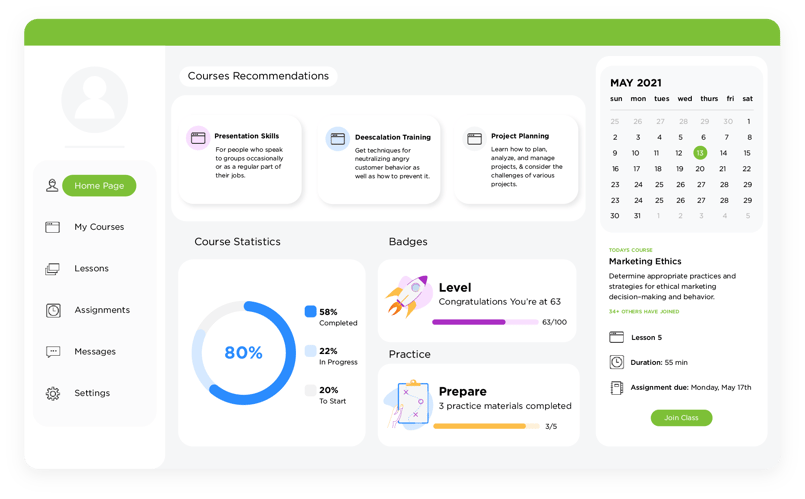Canvas Singapore: A Powerful Learning Management System for Educational Institutions
Selecting the very best Learning Administration System for Your Organization
Selecting the optimum Understanding Management System (LMS) for your organization is a multifaceted decision that requires cautious factor to consider of various aspects. From defining specific knowing goals that reverberate with your strategic vision to assessing customer experience, each element plays a pivotal duty in the general efficiency of the system. In addition, recognizing assimilation capabilities and making sure scalability for future demands can not be neglected. As companies make every effort for performance and growth, the choice of an LMS becomes significantly significant. What are the essential considerations that can affect your decision-making procedure?
Specify Your Understanding Objectives
Specifying clear discovering goals is essential for the effective application of a Knowing Management System (LMS) These objectives serve as a roadmap, guiding the development of material, analyses, and overall instructional strategies within the LMS. By establishing details, measurable, possible, pertinent, and time-bound (WISE) goals, companies can make certain that the learning experiences are lined up with their calculated objectives and learner demands.
Reliable knowing purposes must encapsulate what students are anticipated to know or be able to do upon completion of a course or training program. This quality not only help in content production but also promotes the examination of student progression and the general performance of the LMS. LMS Singapore. Distinct purposes make it possible for stakeholders to analyze whether the chosen LMS attributes and capabilities align with their academic objectives.
Assess Customer Experience
Once learning goals have actually been established, evaluating user experience comes to be an important next action in selecting an appropriate Understanding Administration System (LMS) Customer experience includes the general satisfaction and simplicity with which students communicate with the system. A properly designed LMS must promote intuitive navigation, making certain that users can find programs, materials, and support effortlessly.
To assess individual experience, think about carrying out use testing with a depictive sample of end-users. This can offer valuable understandings into how students engage with the platform. Secret variables to review include the LMS's user interface design, accessibility attributes, mobile compatibility, and the clarity of instructions supplied. Customer feedback is critical; gathering studies or performing interviews can expose usual discomfort factors and locations for enhancement.
In addition, examine the schedule of support resources, such as tutorials and aid facilities, which can enhance the customer experience. The responsiveness of customer support is also critical; prompt aid can significantly reduce aggravations that users may experience. Eventually, choosing an LMS that prioritizes user experience not only enriches the learning process yet also promotes greater engagement and complete satisfaction among students.

Evaluate Integration Capabilities
Recognizing the significance of seamless functionality, examining assimilation capabilities is critical when choosing a Discovering Management System (LMS) An efficient LMS ought to help with interoperability with existing systems, such as Human Resource Management Equipment (HRMS), Customer Relationship Monitoring (CRM) platforms, and various other academic devices. This assimilation enhances information flow, lowers administrative problems, and makes sure a cohesive learning atmosphere.
When assessing an LMS, think about the kinds of combinations provided. Search For Application Programs User Interfaces (APIs), Solitary Sign-On web link (SSO) abilities, and pre-built adapters that improve combination procedures. Additionally, validate the LMS's capacity to integrate with third-party devices, such as content collections or evaluation platforms, which can dramatically improve the discovering experience.

Consider Scalability and Adaptability
As companies develop, the capability of a Learning Management System (LMS) to scale and adjust comes to be progressively crucial. A scalable LMS can accommodate growth in customer numbers, course offerings, and web content without jeopardizing efficiency or user experience. As businesses increase, whether through increased workers, new areas, or diversified training requirements, the LMS must effortlessly expand alongside these adjustments.
Flexibility is equally vital; a reliable LMS must sustain different finding out methods, such as online, blended, and mobile discovering. This adaptability enables companies to react promptly to emerging trends in training and development, making certain that they can use appropriate and appealing understanding experiences - LMS SG. In addition, the system must give adjustable attributes, enabling companies to tailor the LMS to their particular requirements and branding
Additionally, a versatile LMS must incorporate quickly with existing systems and tools, facilitating a cohesive understanding ecological community. Hence, when selecting an LMS, it is vital to assess not just its existing capacities but also its potential to adapt and grow abreast with the organization's critical goals and advancing finding out needs. This foresight can significantly enhance the long-term stability of the chosen LMS.
Review Costs and Budgeting
When examining an Understanding Management System (LMS), assessing prices and budgeting is vital to make sure Continue that the investment straightens with the company's financial capacities and tactical goals. Organizations needs to begin by identifying the complete expense of possession, which includes licensing costs, application costs, upkeep, and any added costs such as training and technical assistance.
It is vital to compare different LMS alternatives, as pricing versions can vary substantially amongst vendors. Some systems might supply a subscription-based version, while others might charge an one-time charge. Organizations ought to additionally think about the scalability of the LMS; as they expand, the price structure might change, affecting lasting budgeting.

Conclusion
Choosing a proper Discovering Management System (LMS) is vital for accomplishing organizational discovering purposes. Inevitably, the appropriate LMS serves as an essential tool in promoting an effective knowing atmosphere and driving organizational success (LMS Singapore).
Selecting the optimum Knowing Administration System (LMS) for your company is a multifaceted choice that calls for careful factor to consider of various aspects.Defining clear knowing objectives is important for the successful application additional info of a Discovering Administration System (LMS)Once discovering purposes have actually been established, reviewing individual experience ends up being a crucial next step in selecting an ideal Knowing Management System (LMS)As organizations advance, the ability of a Learning Monitoring System (LMS) to scale and adjust ends up being progressively important.Selecting an appropriate Knowing Monitoring System (LMS) is vital for achieving organizational discovering purposes.